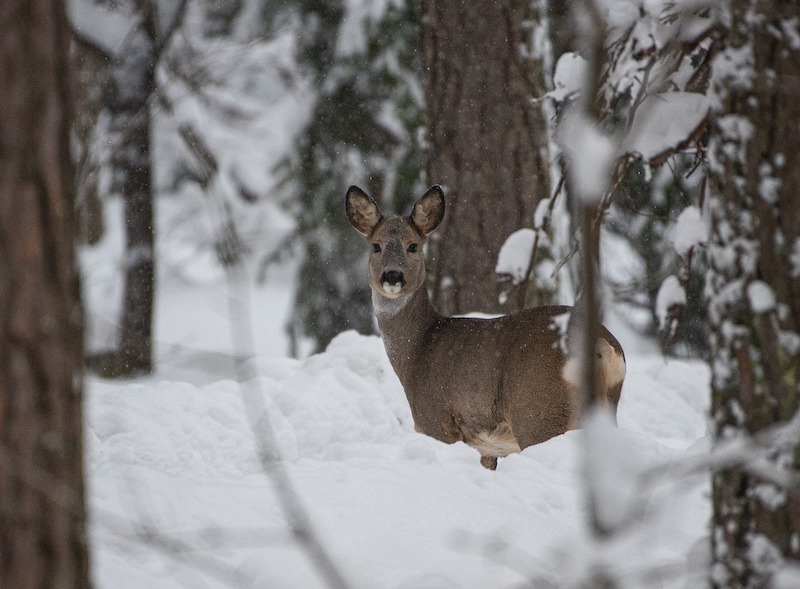Pine trees, Pinus sp., are seldom damaged by deer. Deer will typically graze on species of pine that are native to the local geographic area, and they prefer to eat some species of pine more than others. Pine species that are most prone to deer damage are eastern white pine, Mugo pine, Scotch pine, and Austrian pine. Pitch pine, red pine, and Japanese black pine are less often browsed by deer. The diet of deer changes seasonally based on what is available. As evergreens, pine trees are a frequent food source of deer in the winter. However, it is rare for deer to eat pine trees when other plants are readily available to eat. Young pine trees and seedlings are more likely to be eaten by deer than taller, mature trees.

Deer may also cause damage to the bark of pines and other trees. Bucks will rub their antlers on the bark of trees to mark their territory or clear velvet off of their antlers. In doing so, sections of the tree’s bark are stripped from the trunk. This can result in girdled bark if the entire circumference of the tree is affected, or allow a pathway of entrance for numerous pests and diseases. Bucks are more likely to target younger trees or species of trees with smooth bark, so pine trees are low on the list of trees affected by antler rubbing. However, it is still important to recognize signs of girdling in pine trees, as it can be dangerous to the health of the plant.
| Rarely Damaged |
| Seldom Severely Damaged |
| Occasionally Severely Damaged |
| Frequently Severely Damaged |
Keeping Deer Away From Pine Trees
Protecting pine trees from deer is simple, as deer prefer to eat other plants before eating pine. Saplings and young trees should be protected from deer with mesh wiring. Wrap the trunk of young pine trees with hardware cloth to protect from antler rubbing and girdling. Select pine trees that are less likely to be browsed by deer, such as Japanese black pine, rather than species preferred by deer, such as eastern white pine. If deer browsing is a frequent problem for your pine trees or other plants, deer fencing is available and should be at least 8 feet tall to discourage deer from jumping over the fence.
Will Pine Trees Come Back After Deer Eat Them?
Pine trees will recover from deer damage as long as their apical meristem is intact, which is the terminal point from which growth occurs in pine trees. Even if significant grazing damage is done to side branches, the pine tree will survive with some maintenance. Prune off any branches that have been damaged by deer using clean, sterilized pruning tools. Provide appropriate water, fertilizer, and mulch to encourage healthy growth and rejuvenation. If small seedlings are eaten whole, it is unlikely for them to recover. Likewise, it is rare for a pine tree with girdled bark to recover, as bark is necessary in helping to transport water and nutrients. For stripped bark, it is best to allow the pine tree to naturally heal itself. Clean the wound and trim off any loose pieces of bark to help with the healing process. Sometimes, a type of grafting known as bridge grafting may be performed to save girdled trees.
Sources: Rutgers New Jersey Agricultural Experiment Station ‘Landscape Plants Rated by Deer Resistance’ 2018
 |
Lauren Youngcourt - Published 03-23-2023 |
